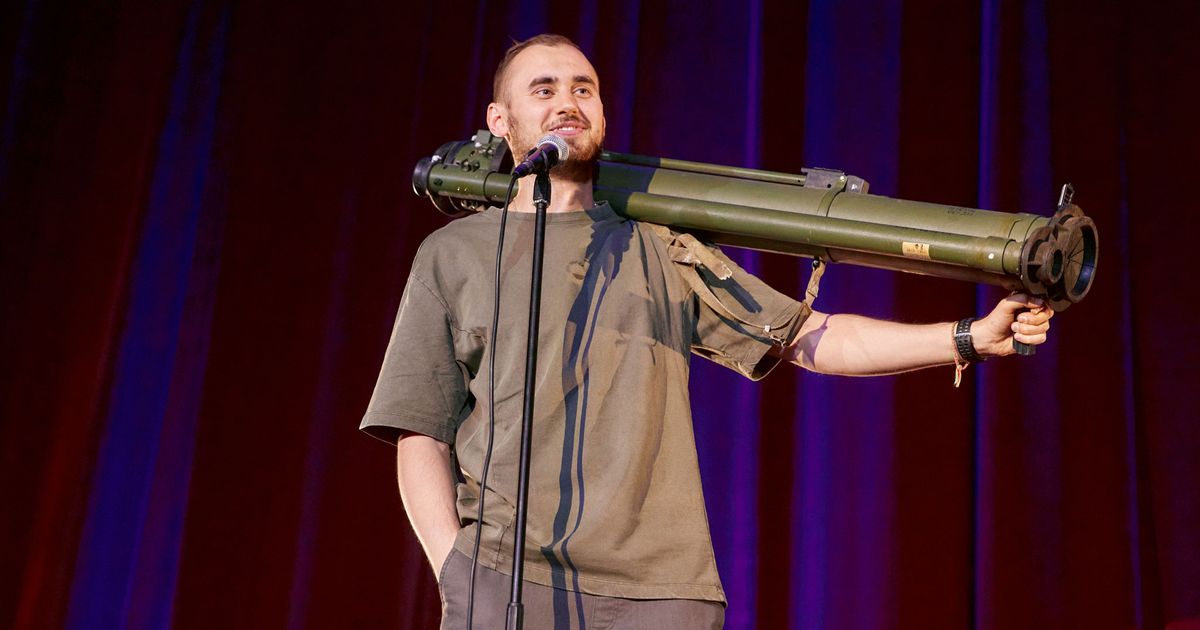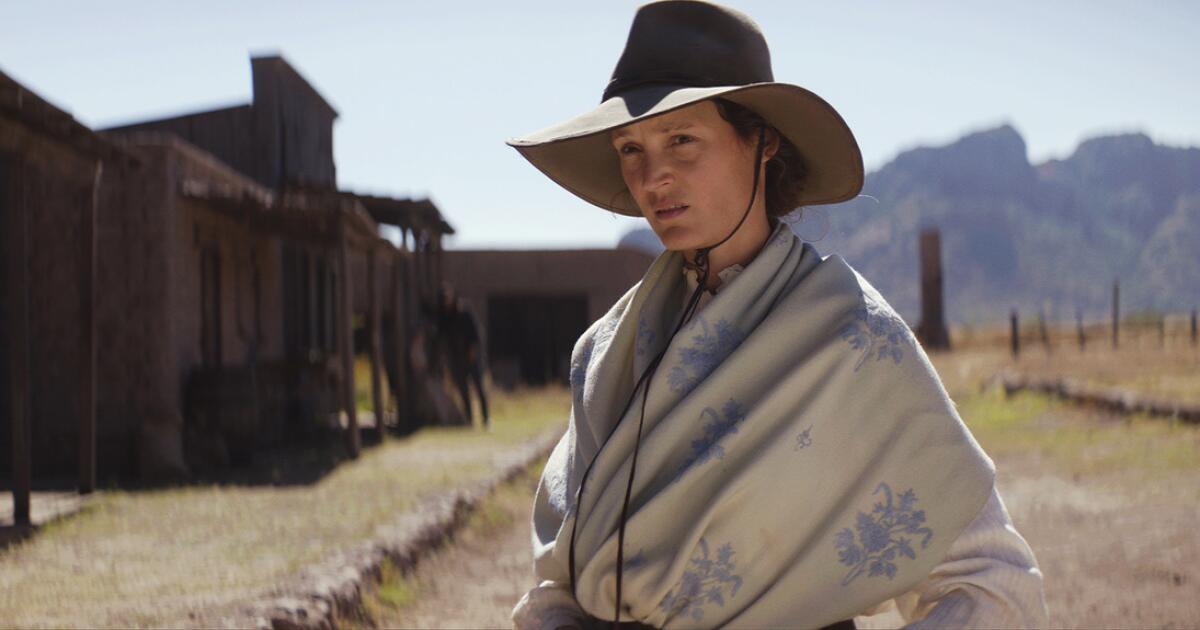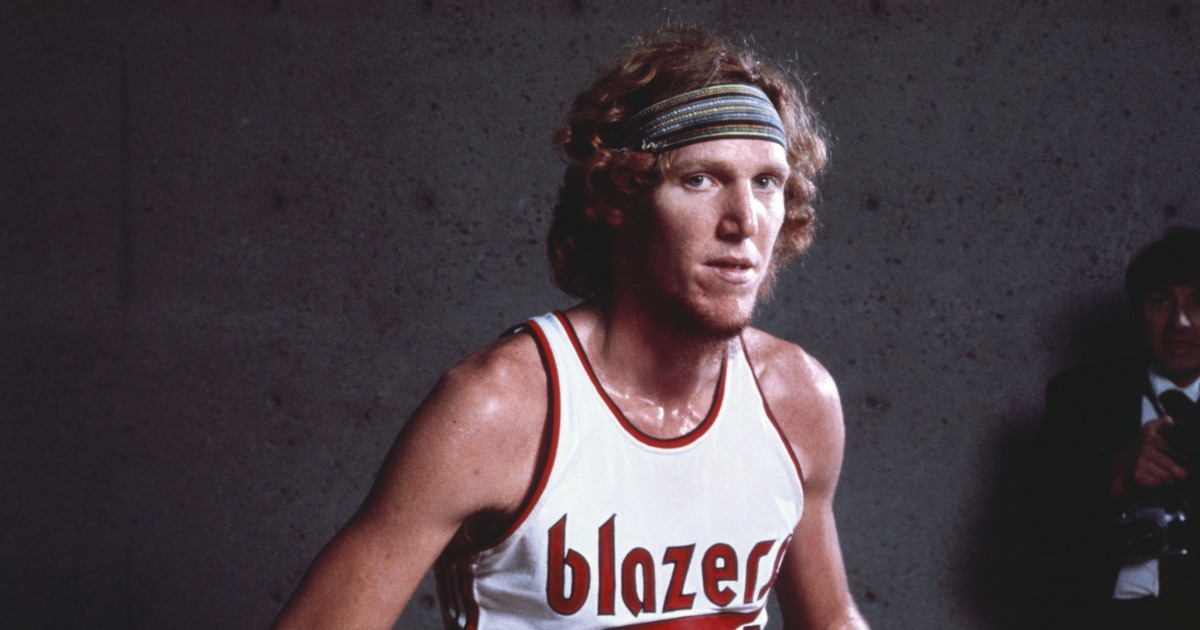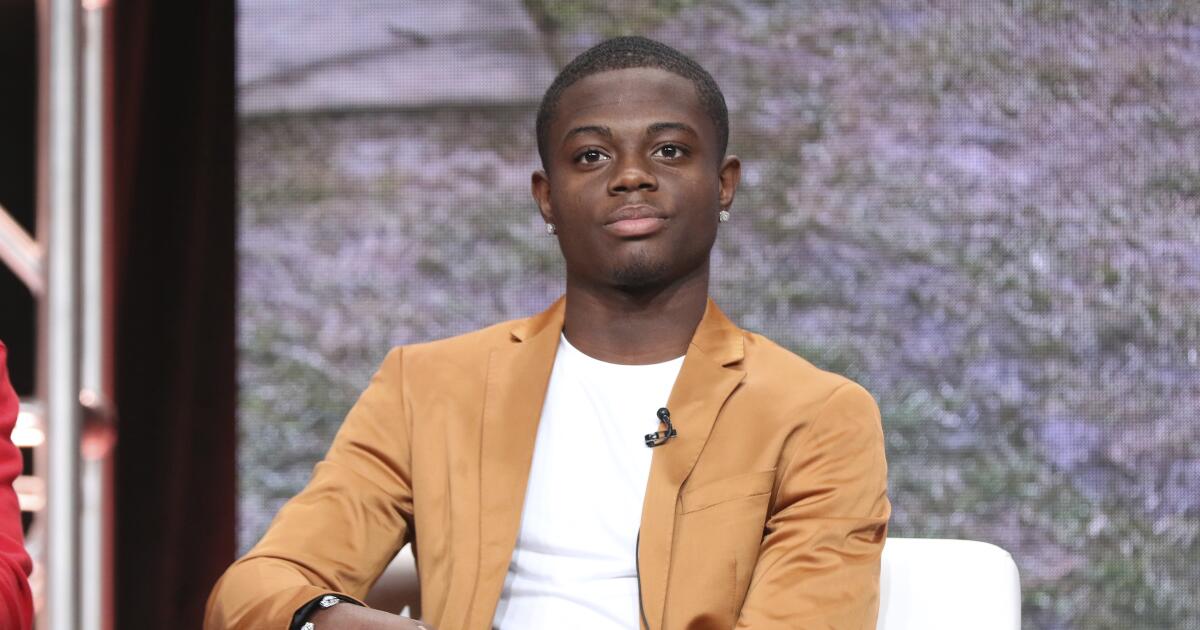Lipko stands onstage after a comedy show on June 3. After shows, he leads charity auctions for items he brought back from the front lines. This time, it’s an RPG grenade launcher from the Kharkiv counteroffensive in fall 2022.
Photo: Oli Zitch
Serhii Lipko has a dark theory: What if, the Ukrainian stand-up comedian turned soldier says, he already died in Donbas, and everything he’s experienced lately — a sold-out comedy show at the 1,700-seat Zhovtneviy palace in October 2022, meeting David Letterman backstage at his local Kyiv comedy club while filming his Netflix series — is nothing but an agony-induced hallucination? “It all just seemed unreal to me. Is it really happening? Maybe I did die back in Donbas and it’s all just a glitch in the matrix?” Lipko takes a pause, then quips, “Wait, Letterman is still alive, right?”
After a year and a half in an active war zone, Lipko seems a changed person, but the instinct to find the punchline remains. That’s only natural: He’s performed stand-up ever since the new wave of Ukrainian stand-up culture established itself after the 2014 Euromaidan protests and Russia started the war with Ukraine. Back in 2015, Lipko co-founded a comedy club in Kyiv, but shortly thereafter he was drafted in the army. “In my mind, I was always preparing for the war,” he says. “It’s funny to remember now, but my friends kept asking me, ‘What kind of war can possibly start in the 21st century?’”
Since last speaking with Lipko after he enlisted in March 2022, the comedian was deployed to an infantry unit as a military medic, spent time stationed in the Donetsk region, joined an air-reconnaissance unit, and took part in the first Ukrainian counteroffensive near Kharkiv. As recently as March, he was also operating military drones in Bakhmut, the town that was wiped off the face of Earth by Russia and became the symbol of resistance for the armed forces of Ukraine. (He also got married to fellow comedian Nastia Zuhvala, though he says he hasn’t “really had a chance to feel that I’m married in the last year.”) While his military comrades know about his day job — his callsign is “Stan,” short for “stand-up” — his comedy career has understandably taken a backseat to fighting in the war. “There’s this question I’m often asked in interviews: ‘Have you had any new ideas for comedy projects?’ And to me, that just shows that they have no idea what’s going on. Like, I did come up with a couple of ideas. Mainly ideas how to survive at war,” Lipko says. Still, in the short stints he’s had back in Kyiv — where Ukrainians pushed back Russian forces against all odds last spring — he’s managed to find time for comedy and record three stand-up specials. The third, Serhii Lipko Appears to Have Written a New Special, is slated to be released on YouTube in July.
“Stand-up helps me to remember who I am. It also helps to remind people about me,” Lipko explains. “I’m not going to lie: I do feel jealous of the Ukrainian comics who are still performing, because I’m at war and they are touring.” He pauses. “Like, in the years I’ll probably spend in the army, a whole new generation of comics will come through. They will gain a following, they will sell out their gigs. For me, it would be okay just to survive with my hands and legs intact. The specials I put out are making the point of reminding that I’m still here.”
Lipko is 29 now. He’s lean and sporting a short beard when we meet on a hot June day in a downtown Kyiv café. Ahead of the release of his newest special, he opened up about dark humor from the front lines and the first thing he’s going to do after the war ends. (This interview has been translated from Ukrainian.)
There’s a surreal moment in your special when you assume that maybe it’s all a hallucination for you, that in reality you were killed in action long ago. I guess that’s the only place we can start with.
I mean, that’s how I felt at the moment. It just seemed like it all came together right then and there. I sold out Zhovtneviy palace, then there was the Letterman taping, and you’re like, Is this really happening?
The thing is we just don’t know how it is, what dying feels like. I remember these moments when our unit was being shelled, the bombs falling just behind us. And you’re like, “Whew, that was close!” Maybe it wasn’t “just close,” you know? Maybe I am dead.
Then there’s this idea that we all die, sooner or later. You just have to come to terms with it. The difference is we feel it in Ukraine constantly these days — that death is always very, very close.
You filmed the first Ukrainian wartime comedy special back in April 2022, at the first stage of the full-scale Russian invasion, in an actual bomb shelter. And it plays like a time capsule of the period now.
I did not set out to document a time period, it just happened. I would never have imagined it then, but that taping is my favorite now. It just shows all the confusion and fear we felt at the time, the sheer scale of the unknown. And I just see myself there as this naïve child: Look, he’s just joined the Territorial Defense unit. He has no idea what’s coming for him.
Since then you joined the infantry unit, serving in Donbas, then you changed gears and started training in air reconnaissance, operating military drones. Stand-up is obviously not a priority for you at the front lines, but a lot of material about that eventually found its way to your stand-up act.
Yeah, “not a priority” doesn’t really do it justice. I just didn’t think about it, period. Like, the stand-up act I worked on prior to February 24 was to be called Opportunity. It was named after the Mars rover; outer space was a big theme for me. The plan was to film a perfect stand-up special — and then the war comes, and all the producing plans go out of the window.
Why do we do comedy? I believe it’s the way to turn a problem into a joke. That’s even more relevant when you’re at war, because your brain wants to turn your painful experience into a joke. The pain is there, and it will stay with you. It will keep hurting you, so the instinct is to devalue it. So I do stand-up now, basically, for self-preservation. It’s kind of a survival instinct. I’ve worked through some experience, turned it into a joke, performed it for the live audiences, and laughed, hopefully with the audience. And it makes me feel better, at least sometimes.
So you do find that process therapeutic?
It does help. A stand-up gig is essentially just an opportunity to breathe out. You can make fun of some weird shit you went through for an hour. If I don’t do it, the shit stays with me. So it gets tough.
Audience reaction helps too. Their support helps. You realize that someone else needs it. I mean, the shows are selling out, and not because they want to help a Ukrainian soldier. Look, I could’ve lived the most boring life and wrote about it. I used to come up with all these superficial problems. But what is comedy if it isn’t lived and thought through pain and suffering?
Yeah, but how do you turn war stories into comedy? How does that become a part of your act?
I guess the analogy of my process is this writers’ room that I have in my head. I call it “The Stand-Up Committee.” [Laughs.] So there’s like a unit in my brain that comes up with stand-up material. But when you’re at war, the writers close that door, so they’re basically trapped there. But they still are there, and they still want to work. It’s like a millstone, ready to grind out the new material.
So the first show I did was me testing this writers’ room. I went back to Kyiv for five days, and I had some time to breathe out. Then I thought, Huh, let me open up that door. Are the guys there still at work? So I dropped them some ideas, and they’re like, Wow, so that’s what working feels like! So they churned out these jokes. And I’d go, Great, the millstone still works!
It’s tough when you have to write new material and there’s nothing there, but any comedian knows that when you have an interesting experience — especially when you have something as unique as a war-zone experience — that always works better. Here goes another analogy for you: Before the war, I had to carve a sculpture from this little stone. It was brittle, and the whole process was just boring. But now I feel that I’m working with this huge granite stone. It’s like, Wow, I can carve out anything I want here!
The unique experience comes with a price, though.
War is weird, man. I’m not going to tell anything new about it. I remember watching these old war films when I was a kid, and there’s always this scene where a soldier gets a medal and he’s like, “I just wish it all never happened. I’d rather forget all the war stuff.” That’s what I want now: just to forget it. I’d rather keep churning out jokes about therapy and whatnot. But I can’t — at least for now.
You must have these moments at war, like, Damn, that’s a great set-up for a joke. That’s a line I could use.
There are. The lines are usually not mine, though.
You’ve mentioned that your brothers in arms have had a chance to watch your act.
Yes, they do come to my shows. And they do heckle me. It’s not heckling, per se — they just shout something out to me. They mostly feel that my act is too light. They got used to the really dark humor we have in the military. They don’t necessarily know that I set out to perform for a live audience of civilians. So they just shout, because they want me to tell some other story. And if I did that, there would be a lot of crying in the audience. But the military guys would probably laugh.
We have these tours now, with stand-up comics joining musical acts at these concerts for soldiers. Would you do it?
I mean, I could. It’s just that I don’t think that soldiers on the front lines would want to listen to my act. That would be a tough gig, because they live through the material themselves.
You also told me that you’re probably not the funniest guy in your unit.
Oh, man, the guys are so funny. I went through a lot with them, and people tend to open up to you after these tough shared experiences. That’s when the comedy really thrives. It does need some context, though. The jokes we tell amongst ourselves just wouldn’t land here in Kyiv. And it would be tough for any soldier to replicate the act, like, in a podcast recording. You just had to be there, I guess.
It’s not only jokes, though. For instance, we had a great story with this guy, his callsign is Troy. His unit got ambushed, and the Russians killed most of the team. Troy was presumed dead too; there was no contact with him for days. And then he just calls us: “Hey, I’m okay. I need an extraction.” That’s fucking legendary stuff, man. That’s something you see in the movies; that’s the story to tell for generations. But when you ask Troy to tell it, he’s like, “Yeah, so there was an ambush, we got in a firefight, then I got back.” I mean, Troy, that’s a book deal for you! But he’s not interested in stuff like that.
That brings me to this question of your perspective. You are not the only Ukrainian comedian in the armed forces, but you are the most high-profile. That makes up for quite a big platform. You might have used it to tell the stories of the fellow soldiers, but in fact, you make the point of reminding the audience that you’re not speaking for everyone in the army, that it’s only your experience that you’re talking about in your act. Why is that?
Everyone experiences this war in a different way. There are different service branches, there are different tasks. How can I possibly speak for everyone? Like, I’m not in the trenches now. How can I speak to the guys’ experience on the front lines? I’m in the air-reconnaissance unit — I operate drones 800 meters away from the front lines. Yes, we are being shelled, we do have bullets flying over us, but it’s not the same as the infantry units fighting with the Russians 800 meters at the front.
One of the most poignant moments of the new special involves a case of rabies. Basically, you have a suspicion about contracting rabies from a dog that was sheltering with your unit, and the punchline is, “It would be so dumb to die from rabies while you’re in Bakhmut.”
Yeah, I can’t really take credit for that. The punchline was actually my friend’s. What I had to do was to tell the story just right, to convey my emotions at the moment.
When I come up with the act’s structure, the thought process basically is, Okay, what stories can I tell the audience? It’s a tough balancing act, because you want to be truthful, but at the same time you want people to laugh. You definitely don’t want to traumatize them. And the thing about the front lines is that these light-hearted stories are hard to come by.
How did the Zhovtneviy show come about?
That gig was actually a huge gamble. The idea was to announce my stand-up concert at the biggest Kyiv comedy venue. In order to do that, you have to book a date well in advance and organize the whole thing. The problem was that I wasn’t sure that I would be able to go to Kyiv. But it was just after the Ukrainian counteroffensive in the Kharkiv region, and the tactical situation was stable. So I remember making these last drone flights and thinking, Well, it would sure suck if I’d get hit in the last hours and the concert gets canceled because I was killed or injured. [Laughs.]
And all you worried about was the concert.
Of course I was! 1,700 people bought tickets! I wouldn’t want to let them down.
Anyway, that’s why the first special was called Serhii Lipko Performs for an Hour and a Half, God Willing, If Everything Would Be Okay. Then the next act was Serhii Lipko Writes a New Special, and the latest is Serhii Lipko Appears to Have Written a New Special. That’s just me being honest.
This idea of finding balance between comedy and truthfully conveying your war-zone experience — how do you work with that?
I have this model in my head: I imagine myself sitting with the live audience and watching my act onstage. If I laugh at the jokes, they usually stay in my act. I have to be my harshest critic, so I criticize the jokes brutally. Sometimes I’m my worst heckler.
That’s essential to my process — lately even more so, because I have this tendency to turn my act into this weird pessimistic speech, and the last thing I want to do is lecture the audience. So I tell Serhii on the stage, “Hey mate, thank you for your service, good job. But I did pay money for the gig. And we, the civilians, do understand that our country’s at war. We have shellings every other day here in Kyiv. So please, do your job. Don’t just share your grievances with us.” So it helps me to edit the act, and hopefully it gets leaner and better.
It must help you that the people that go to your gigs are mostly your fans. I mean, you sell out the concerts in a matter of hours, so they must know what they are in for.
Yeah, but it still is a challenge. The first Zhovtneviy taping, I think I was just rude. The truth is I don’t really know what people in the audience think. They might feel it’s too close to home; they might have a friend or relative currently serving in the military. I’m so glad when my brothers in arms can go to my shows when they are on leave — it brings me joy to hear them laugh. But at the same time, there may be people in the audience that tend to forget that Ukraine’s still at war: “Let’s go and listen to what’s funny in the army.” And there’s nothing funny. Not really.
So the way I tackled it was: Let me go out and tell some jokes, and then let’s go hard. That’s where the “There’s a chance I’ve already died” bit comes in. And there was audible crying in the audience. That’s the challenge for any comedian: How do you pull it off, tone-wise? Like, there are some jokes in the act, and then there’s this dramatic moment. How do you pull this nosedive off and finish the gig on a positive note?
What’s the air-reconnaissance analogy here?
That’s FPV drones for you. That’s the nosedive equivalent: They are most difficult to operate. But it feels great!
I keep going back to the talk we had after a show a couple of years back. You had all these plans: You just had your first open mics in English, and there was this idea to develop material in English and perform at comedy festivals in Europe. And now you’re at war. I guess what I’m trying to ask you is whether it feels like you were robbed of time, with Russia waging this war in Ukraine.
Yeah, I don’t really think about it at all. It seems like a discussion for peaceful times. Was I robbed of the time? For me, the stakes are higher: The Russians are stealing the lives of our people, so it’s not the time we should be concerned with now. Every day people are losing their homes, they’re losing limbs. So I don’t worry about the war ruining my stand-up career goals. Actually, being able to perform stand-up in those circumstances brings me a lot of joy. I’m just glad that even in wartime, I found another way to be useful.
It seems almost trivial to ask how you have changed after this year and a half of full-scale war. Do you feel you are a completely different person now?
I’m still the same, I just have more confidence. I’m definitely willing to take more responsibility. Like, yeah, everyone who joined the military understands the risks involved, hence the death topic we discussed. But you’re honest with yourself, and you stand strong. I don’t have any skeletons in my closet. And when I have an opportunity, I can share my feelings and my experience with people onstage.
That’s another big shift for me: I have this longing to communicate with people. I want to perform — I do — but I also want to talk to people from the stage.
Have you put any thought into what you want to do after this war ends? Is your idea of a stand-up special in English still on the table for you?
No, I don’t want to make a special in English. When the time comes and all these big streaming services would want to buy Ukrainian stand-up specials, I’ll do it in Ukrainian. The Ukrainian language is great, and you can always turn subtitles on. I’ve watched all the Netflix specials in English with Ukrainian subtitles for so long, so now it’s your turn!
So what’s the first thing you will do after the war?
God willing, I will have all my limbs intact, and will probably go on a European tour. Make it a world tour! We have Ukrainians all over the world, they are helping the Ukrainian cause every single day, and they have the most generous donations. It would be great to put out some shows for them.
We’re also cognizant of the fact that after the victory, we would still have a lot on our plate. The need for veteran reintegration and other social projects is already there, and I believe that stand-up could be of great help in supporting and highlighting these issues. I would be glad to perform at these events.
Another thing I keep coming back to is about the stand-up itself. For a long, long time, stand-up was the most important thing in my life — stand-up first, then everything else. Now that it all changed, I see that there are things that matter to me way, way more. It’s great when my fellow army men thank me, when they tell me that my act helps them in some way. I’m so glad to hear it. But in wartime, you understand that comedy can only go so far.
I guess what I’m trying to say here is that I look at stand-up differently now. It’s not the most important thing for me, but it’s a great way to help. So it’s not comedy for the sake of comedy, it’s comedy for a bigger cause. I basically treat it as an instrument that can make a difference.















